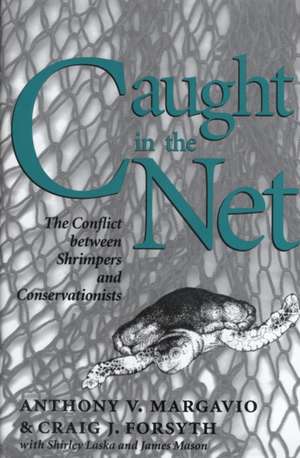Caught in the Net: The Conflict Between Shrimpers and Conservationists: Kenneth E. Montague Series in Oil and Business History
Autor Anthony V. Margavio, Shirley Laska, James Masonen Limba Engleză Paperback – 31 dec 1995
Their action, the largest protest over marine resources in the history of the United States, was only the most visible response to a highly charged conflict.
"Caught in the Net" examines how national environmental groups identified a threat to sea turtles, spearheaded a drive to protect them, and saw their efforts result in the federal government's requirement that shrimpers use TEDs. The authors analyze the conflict that arose in reaction to the new regulations, highlighting the complex of alliances that developed.
Based on extensive interviews with the participants, "Caught in the Net" highlights the modern ambiguities and tensions between environmental protection and those whose lives are based on what the environment offers.
Din seria Kenneth E. Montague Series in Oil and Business History
-
 Preț: 135.90 lei
Preț: 135.90 lei -
 Preț: 144.27 lei
Preț: 144.27 lei -
 Preț: 119.49 lei
Preț: 119.49 lei -
 Preț: 113.94 lei
Preț: 113.94 lei -
 Preț: 195.89 lei
Preț: 195.89 lei -
 Preț: 153.91 lei
Preț: 153.91 lei - 7%
 Preț: 327.75 lei
Preț: 327.75 lei
Preț: 260.40 lei
Nou
Puncte Express: 391
Preț estimativ în valută:
49.83€ • 51.71$ • 41.65£
49.83€ • 51.71$ • 41.65£
Carte indisponibilă temporar
Doresc să fiu notificat când acest titlu va fi disponibil:
Se trimite...
Preluare comenzi: 021 569.72.76
Specificații
ISBN-13: 9780890966693
ISBN-10: 0890966699
Pagini: 176
Dimensiuni: 159 x 237 x 21 mm
Greutate: 0.49 kg
Ediția:New.
Editura: Texas A&M University Press
Seriile Kenneth E. Montague Series in Oil and Business History, Kenneth E. Montague Series in Oil and Business History (Hardcover)
ISBN-10: 0890966699
Pagini: 176
Dimensiuni: 159 x 237 x 21 mm
Greutate: 0.49 kg
Ediția:New.
Editura: Texas A&M University Press
Seriile Kenneth E. Montague Series in Oil and Business History, Kenneth E. Montague Series in Oil and Business History (Hardcover)
Notă biografică
ANTHONY V. MARGAVIO teaches sociology at the University of New Orleans.CRAIG J. FORSYTH is a professor of sociology at Southwestern Louisiana University.SHIRLEY LASKA was recently named vice chancellor of research at the University of New Orleans.JAMES MASON is pursuing his doctorate at Cornell University.
Textul de pe ultima copertă
In the summer and fall of 1989, hundreds of shrimpers captained their vessels into position to blockade the ports and waterways of the Gulf of Mexico. These shrimpers, challenging the required use of Turtle Excluder Devices (TEDS) to protect turtles from being caught in shrimp nets, felt themselves caught in the net of government regulation. Their action, the largest protest over marine resources in the history of the United States, was only the most visible response to a highly charged conflict. National environmental groups, including the Center for Marine Conservation, had spearheaded a drive to protect sea turtles, which they believed were threatened by commercial fishing nets. Their efforts resulted in the federal government's requirement that shrimpers use TEDS, devices designed to greatly reduce turtle bycatch. In the ensuing conflict, alliances were complex. State governments divided in their responses, with Florida quickly implementing the regulations and Louisiana suing to block them. Local chapters of the very environmental groups that had led the fight for TEDS remained strangely quiet. Government agencies went head to head with the groups they were supposed to support. This gripping tale, based on extensive interviews with the participants, highlights the modern ambiguities and tensions between environmental protection and those who make their livings from - and base their way of life on - what the environment offers. Hundreds of shrimpers, policymakers, researchers, and others connected with the shrimping industry told the authors their particular "truths" in the conflict. The result is not only the dramatic story of an episode of environmental-economic conflict but also atrenchant analysis of the complexities of change and tradition as America's coasts are transformed from farming and fishing villages into other kinds of communities with other agendas.
